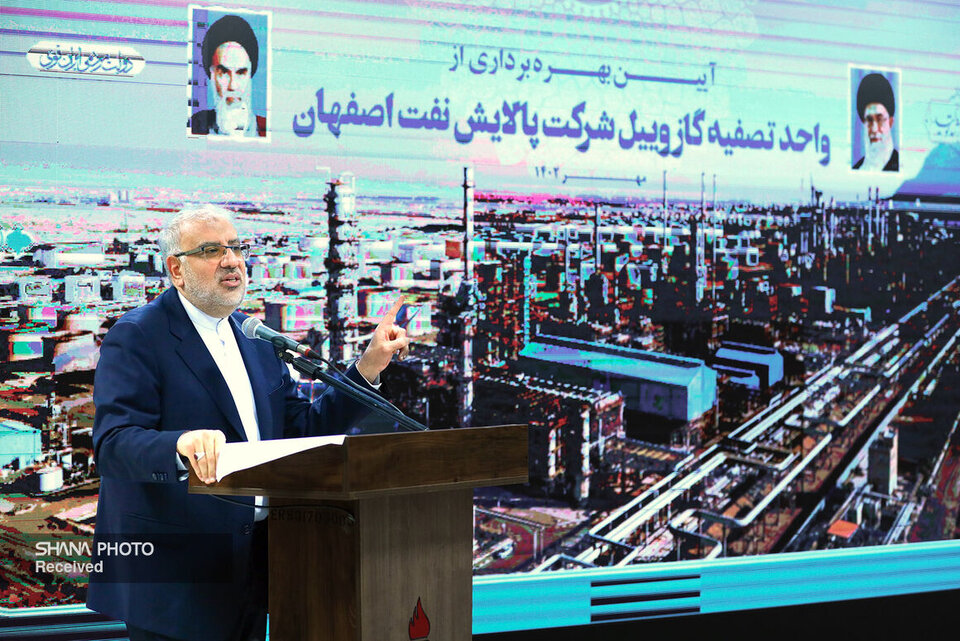Delivering speech during the inauguration ceremony of Isfahan Refinery’s Diesel Hydrotreating (DHT) Unit, also attended by President Seyyed Ebrahim Raeisi, the minister added eight gas condensate and oil refinery and integrated refinery and petrochemical complex projects are underway.
Completing unfinished projects
Owji said the Oil Ministry has given top priority to the completion of unfinished projects since the 13th administration took office.
He added several half-done projects were completed with an investment of $12 billion in the previous Iranian calendar year, which ended on March 20, 2023.
The ministry will inaugurate 67 megaprojects and semifinished plans worth $15.1 billion in the current year, mentioned the top official, adding 15 new megaprojects worth $14.3 billion are on this year’s agenda, out of which several have been either inaugurated or prepared for inauguration through investing $7 billion.
“All these projects have direct impacts on increasing oil, gas, and petrochemical production capacities as well as refining capacity of the country,” underlined the minister.
Some of the projects such as the refinery of Phase 14 and Phase 11 of the South Pars gas field, the Persian Gulf Hoveyzeh Refinery, the second phase of Abadan Refinery in Khuzestan Province, and Gachsaran Petrochemical Complex in Kogilouyeh and Boyer-Ahmad Province came on stream in the presence of President Raeisi and now Isfahan Refinery’s DHT, utility, and offsite projects became officially operational, he continued.
Oil sector’s economic growth
Investment and completion of unfinished projects have led to the increase in production and exports and consequently helped the oil sector stand top in Iran’s economic growth ranking in the past two years, Owji stated.
The Central Bank of Iran (CBI) and the Statistical Center of Iran (SCI) registered 16.4 percent and 19.8 percent economic growth for domestic oil industry, respectively, he said, adding the Monthly Oil Market Report (MOMR) of the Organization of the Petroleum Exporting Countries (OPEC) also showed that Iran has regained its position as the third-largest crude oil producer.
Isfahan project
Isfahan Refinery is producing 13 million liters of gasoline and around 20 million liters of diesel meeting Euro 5 standards per day, said the oil minister.
“Today, Refinery’s DHT, utility, and offsite projects became officially operational with the aim of promoting its products’ quality, meeting international standards, and observing environmental regulations more than before,” he emphasized.
The project’s operations started in 2014 and it was among unfinished projects, regretted Owji, adding Iranian experts cooperating with the 13th administration completed it.
The newly-inaugurated unit reduces sulfur content in diesel from 10,000 parts per million (ppm) to less than 10 ppm in order to meet Euro 5 standards, he explained.
The unit’s operation helps prevent the emission of some 300 tons of sulfur per day, noted Owji, saying sulfur granules will be sold.
According to him, around 90 percent of equipment needed for implementing the project has been manufactured by Iranian firms and supplied by domestic companies, namely Nargan, Chagalesh Consulting Engineers, and MAPNA Group.
Reducing air pollution
The aforementioned projects will greatly help improve the country’s environmental conditions through reducing the emission of pollutants, Owji pointed out.
The Oil Ministry’s eco-friendly activities are not limited to the promotion of products’ quality, he said and continued the NGL 3200 plant and the Persian Gulf Hoveyzeh gas refining project were put into operation to collect associated petroleum gas (APG) [of West Karoun fields] and APG of 21 flares of East Karoun fields will be also gathered by mid-March 2024.
Redressing gasoline imbalance
Given the rising gasoline consumption, the country witnessed an imbalance but “we managed to meet domestic needs in summer although consumption exceeded 140 million liters a day”, Owji recalled.
“We are focusing on two measures to redress the gasoline imbalance: Firstly, adopting non-pricing strategies, which helped us manage gasoline consumption and secondly, launching new refineries as soon as possible,” said the minister, expressing hope that two new refineries will come online during the incumbent administration’s term.


Your Comment